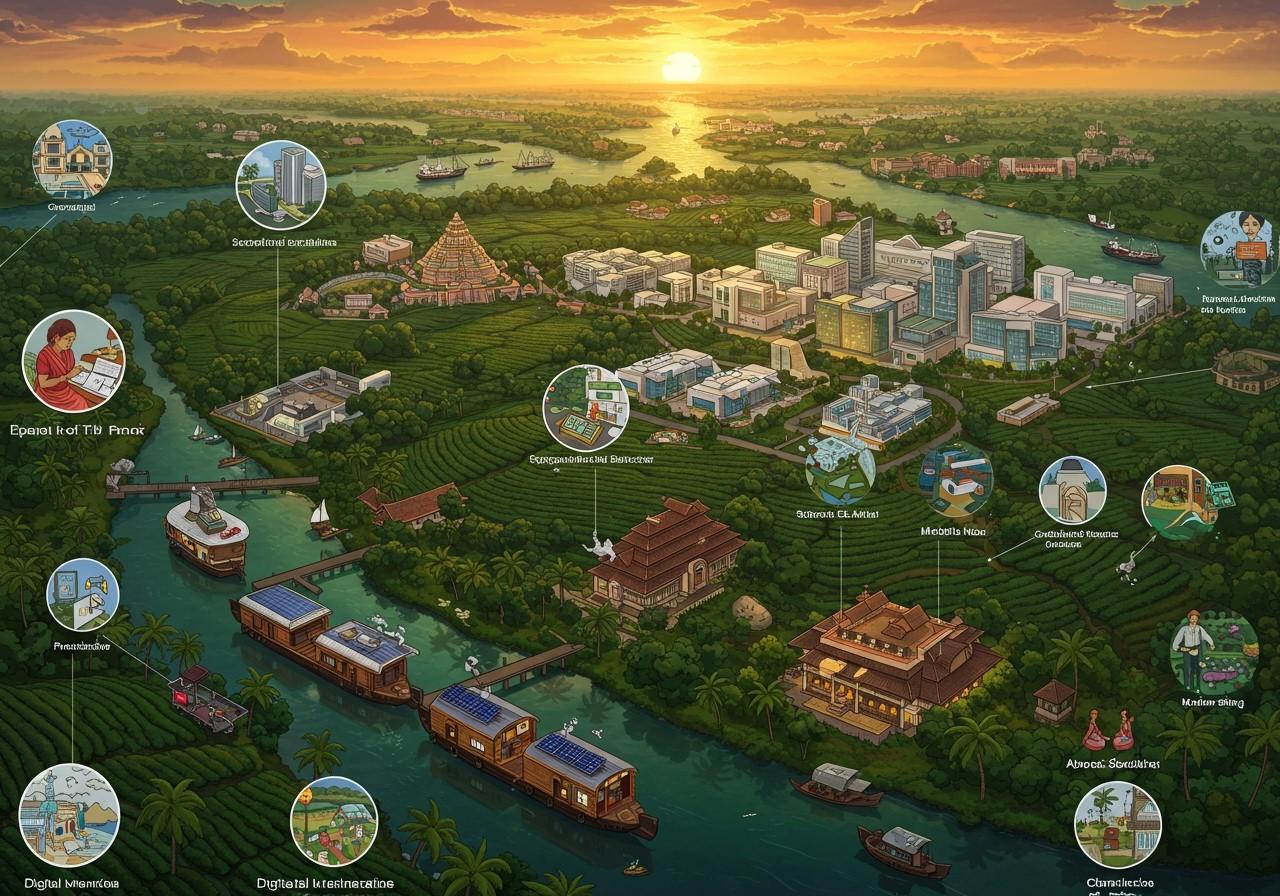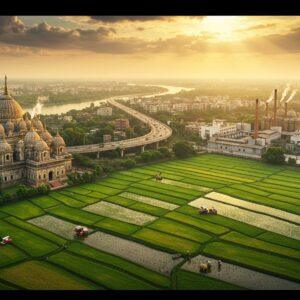
Kerala, often called “God’s Own Country,” is renowned for its rich culture, high literacy rate, and unique development model. This blog examines Kerala’s economic and developmental landscape in 2024-2025, focusing on its population, literacy, economic performance, and sustainable practices.
Kerala’s Dense Population
Kerala is one of India’s most densely populated states. This is due to a confluence of factors:
- Historical and Agricultural Influences: Early settlement patterns and intensive agricultural practices have historically led to higher population density in fertile regions.
- Demographic Factors: A high life expectancy combined with relatively lower birth rates contributes to a steady population growth.
- Migration Patterns: While many Keralites seek opportunities abroad, the state also attracts migrants from other regions due to its perceived better prospects, further increasing the population density.
- Urbanization: The ongoing trend of urbanization concentrates populations in urban centers, adding to the overall density.
This density presents challenges for infrastructure and resource management. However, Kerala’s robust social and healthcare systems effectively support its population. The dense population also influences local markets and employment opportunities.
High Literacy Rate in Kerala
Kerala boasts India’s highest literacy rate, a testament to its long-standing emphasis on education. Several factors have contributed to this achievement:
- Royal Patronage: The historical emphasis on education by the Travancore and Cochin royal families laid the foundation for a literate society.
- Social Reform Movements: Progressive social reform movements championed education for all, including marginalized communities, playing a crucial role in widespread literacy.
- Government Initiatives: Consistent government policies and investments in educational infrastructure, including programs like the mid-day meal scheme, have further strengthened the state’s commitment to education.
- Public-Private Partnership: A strong network of both public and private educational institutions ensures access to quality education for all.
This high literacy rate translates to better job opportunities and an enhanced quality of life for Keralites.
Kerala’s Economic Performance (2024-2025)
Kerala’s economy is projected to be the 11th largest in India in 2024-2025, boasting a GSP of ₹13.11 lakh crore (US$157.45 billion) and a per-capita GSP of ₹372,783 (US$4,400), the sixth largest in the country. The tertiary sector, encompassing IT and healthcare, is the largest contributor to the GSVA, followed by the secondary and primary sectors.
Key aspects of Kerala’s economy include:
- Key Sectors: Tourism, agriculture (a leading producer of rubber), and remittances from the diaspora are significant contributors to the state’s GDP.
- NRK Remittances: Remittances from Non-Resident Keralites (NRKs) play a crucial role in the economy, providing a significant source of income for many families.
- Traditional Industries: While traditional industries like agriculture and fishing face challenges, government initiatives aim to boost their growth and sustainability.
- MSMEs: Micro, small, and medium enterprises (MSMEs) are vital to Kerala’s economic landscape, providing employment and contributing to local economies.
- Tourism: Tourism remains a major driver of local economies and infrastructure development, attracting visitors from across the globe.
In 2024, Kerala approached the Supreme Court concerning central government powers under Article 293, demonstrating its proactive stance on legal and constitutional matters.
Sustainable Development in Kerala
Kerala’s development model prioritizes human development indicators like health and education, rather than solely focusing on economic growth. This is evident in:
- Healthcare Achievements: The state’s achievements in healthcare, including low infant mortality rates and high life expectancy, underscore its commitment to well-being.
- Environmental Focus: Kerala actively promotes renewable energy and strives to reduce its carbon footprint, showcasing its dedication to environmental sustainability.
- Local Empowerment: Local self-governments play a key role in implementing sustainable development projects, ensuring community involvement and local ownership.
- Social Initiatives: Initiatives like the Kudumbashree mission empower women, reduce poverty, and promote social equality.
Kerala recognizes the challenges and opportunities in balancing development with environmental conservation. Public awareness and community participation are crucial for sustainable practices.
How Poojn.in Supports Kerala’s Traditional Industries
Poojn.in, India’s largest cultural goods and services store, actively supports Kerala’s traditional industries by offering a wide range of authentic products:
- Natural Blue Dye (Nilathodu): Poojn.in offers authentic Nilathodu powder sourced from Kerala in various quantities (link to product), directly supporting local producers of this traditional natural dye. This ensures the preservation of this unique craft and provides a sustainable income for local communities.
- Local Artisan Support: The platform connects Kerala’s traditional artisans with a wider market, helping them thrive and preserving their craft. This bridges the gap between skilled artisans and customers seeking authentic, handcrafted ritual items.
- Eco-friendly Products: Poojn.in offers a range of natural and sustainable ritual items from Kerala, including traditional clay items, herbal cosmetics, Ayurvedic herbs (Jaribooti), and natural decorative items (link to product category). This promotes eco-conscious practices and supports local producers of sustainable goods.
By providing a platform for Kerala’s artisans and producers, Poojn.in contributes to the state’s economic growth while preserving its rich cultural heritage.
Conclusion
Kerala’s journey in 2024-2025 demonstrates a unique blend of tradition, progress, and a commitment to sustainable development. Its high literacy rate, robust economic performance, and focus on human development distinguish it as a model for balanced and inclusive growth. As Kerala continues to evolve, its harmonious blend of cultural values and modern advancements will shape its future.


